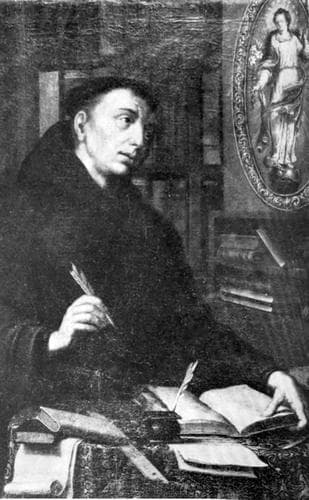
Blessed John Duns Scotus
Blessed
Feast Day: November 8
Death: November 8, 1308
Biography
Blessed John Duns Scotus, also known as Doctor Subtilis, Johannes Scotus, and The Subtle Doctor, was born in 1266 in Duns, Berwick, Scotland. He came from a wealthy farmer family and entered the order of Friars Minor at Dumfries, where his uncle Elias Duns served as the superior.
After joining the order, John pursued academic studies and attended renowned institutions such as Oxford and Paris. In 1291, at the age of 25, he was ordained as a priest at Saint Andrew's Church in Northampton. Following his ordination, John began lecturing at Oxford and Cambridge from 1297 to 1301. In 1301, he returned to Paris to continue teaching and complete his doctorate.
John Duns Scotus was a devout scholar who appreciated the wisdom of various philosophical and theological traditions. He found great value in the Augustinian-Franciscan tradition, while also acknowledging the insights of Saint Thomas Aquinas, Aristotle, and Muslim philosophers. Despite his admiration for these philosophical traditions, John remained an independent thinker, formulating his own unique ideas and perspective. His distinctive contributions to philosophy and theology led to the establishment of a school of thought known as Scotism.
In 1303, when King Philip the Fair sought the support of the University of Paris in a dispute with Pope Boniface VIII over the taxation of Church property, John Duns Scotus respectfully dissented from the king's position. As a result, he was given only three days to leave France.
After a brief departure from Paris, John returned in 1305 and successfully obtained his doctorate. He resumed teaching, displaying an exceptional ability to defend theological doctrines. In 1307, his defense of the Immaculate Conception of Mary was so compelling that the University of Paris officially adopted his position. This work laid the foundation for Pope Pius IX's solemn definition of the Immaculate Conception of Mary in 1854.
In 1308, the Franciscan minister general assigned John to the Franciscan school in Cologne, Germany. However, John's time in Cologne was short-lived as he passed away the same year due to natural causes. He was buried in a Franciscan church near the Cologne Cathedral.
Blessed John Duns Scotus' intellectual contributions and commitment to defend Catholic doctrines continued to be revered long after his death. His beatification was officially recognized by Pope John Paul II on July 6, 1991, and later confirmed on March 20, 1993. Today, he is celebrated and venerated on his feast day, which falls on November 8th. His teachings and writings remain influential in the field of Scholastic philosophy and Catholic theology.